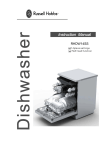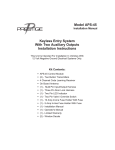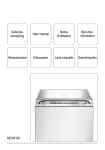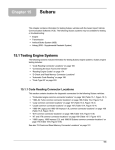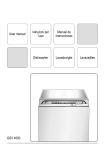Download AEG F 65411 VI Dishwasher User Guide Manual Operating
Transcript
Favorit 65411 VI User manual Downloaded from DishWasher-Manual.com Manuals Dishwasher 2 Contents Thank you for choosing one of our high-quality products. To ensure optimal and regular performance of your appliance please read this instruction manual carefully. It will enable you to navigate all processes perfectly and most efficiently. To refer to this manual any time you need to, we recommend you to keep it in a safe place. And please pass it to any future owner of the appliance. We wish you much joy with your new appliance. CONTENTS OPERATING INSTRUCTIONS SAFETY INFORMATION Correct use General safety Child safety Installation PRODUCT DESCRIPTION CONTROL PANEL Digital display Delay start button Function buttons Setting mode Audible signals USE OF THE APPLIANCE SETTING THE WATER SOFTENER Manual adjustment Electronic adjustment USE OF DISHWASHER SALT USE OF RINSE AID Adjusting the rinse aid dosage LOADING CUTLERY AND DISHES Helpful hints and tips Lower basket Cutlery basket Upper basket Adjustment of the height of the upper basket USE OF DETERGENT MULTITAB FUNCTION To activate the multitab function: To activate/deactivate the rinse aid dispenser: 3 3 3 3 3 4 6 8 8 9 9 9 9 10 10 11 11 12 12 13 14 14 14 15 16 16 17 18 19 19 SELECT AND START A WASHING PROGRAM Select and start a washing program with delay start Cancelling a delay start Interrupting a washing program Cancelling a washing program End of the washing program Removing the load Standby mode WASHING PROGRAMS CARE AND CLEANING Cleaning the filters External cleaning Internal cleaning Long periods of non-operation Frost precautions Moving the machine WHAT TO DO IF… TECHNICAL DATA INSTALLATION INSTRUCTIONS INSTALLATION Adjust the level of the appliance Adhesive steam protection foil Fixing to the adjacent units Custom made kick-panel WATER CONNECTION Water inlet hose Water drain hose ELECTRICAL CONNECTION ENVIRONMENT CONCERNS Old appliance WARRANTY 19 20 20 20 20 21 21 21 23 26 26 27 27 27 27 27 28 29 30 30 31 31 31 32 32 32 33 34 35 35 35 Subject to change without notice Downloaded from DishWasher-Manual.com Manuals Safety information 3 OPERATING INSTRUCTIONS SAFETY INFORMATION For your safety and correct operation of the appliance, read this manual carefully before installation and use. Always keep these instructions with the appliance even if you move or sell it. Users must fully know the operation and safety features of the appliance. Correct use • Only use the appliance to clean household utensils that are suitable for dishwashers. • Do not put solvents in the appliance. Risk of explosion. • Put the knives and all items with sharp points in the cutlery basket with their points down. If not, put them in a horizontal position in the upper basket. • Use only products specified for dishwashers (detergent, salt, rinse aid). • If you open the door while the appliance is in operation, hot steam can escape. Risk of skin burns. • Do not remove dishes from the appliance before the end of the washing program. • When the washing program is completed, disconnect the mains plug from the mains socket and close the water tap. • Only an authorised service engineer can repair this appliance. Use only original spare parts. • Do not do repairs yourself to prevent injury and damage to the appliance. Always contact the Customer Care Centre. General safety • Some dishwasher detergents are strongly alkaline. They can be extremely dangerous if swallowed. Avoid contact with skin and eyes. Keep the children away from the appliance when the door is open. Check that the detergent dispenser is empty after completion of the washing programme. • Obey the safety instructions from the manufacturer of the dishwasher detergent to prevent burns to eyes, mouth and throat. • Only put detergent in the dispenser before you start a washing program. • Do not drink the water from the appliance. Detergent residues can stay in your appliance. • Always close the door when you do not use the appliance to prevent injury and not to stumble over the open door. • Do not sit or stand on the open door. Child safety • This appliance is not intended for use by young children or infirm persons unless they have been adequately supervised by a responsible person to ensure that they can use the appliance safely. Young children should be supervised to ensure that they do not play with the appliance. • Keep all the packaging away from children. There is a risk of suffocation. • Keep all detergents in a safe area. Do not let children touch the detergents. • Keep from children and pets away from the appliance Downloaded DishWasher-Manual.com Manualswhen the door is open. 4 Safety information Installation • Make sure that the appliance is not damaged because of transport. Do not connect a damaged appliance. If necessary, contact the supplier. • Remove all packaging before first use. • A qualified and competent person must do the electrical installation. • A qualified and competent person must do the plumbing installation. • Do not change the specifications or modify this product. Risk of injury and damage to the appliance. • Do not use the appliance: – if the mains cable or the water hoses are damaged, – if the control panel, worktop or plinth area are damaged so that you can get access to the inner side of the appliance. Contact your local Customer Care Centre. • Do not drill into the sides of the appliance otherwise damage to hydraulic and electrical components may occur. WARNING! Carefully obey the instructions for electrical and water connections. Downloaded from DishWasher-Manual.com Manuals Safety information Downloaded from DishWasher-Manual.com Manuals 5 6 Product description PRODUCT DESCRIPTION 1 2 3 4 5 6 7 8 9 Upper basket Water hardness dial Salt container Detergent dispenser Rinse aid dispenser Rating plate Filters Lower spray arm Upper spray arm Light beam After the start of the washing program, a light beam shows on the floor below the appliance door. If the appliance is installed higher with a flush kitchen furniture door, the light beam will not be visible. Light beam The red light is on. Indication of the start of a washing program. The red light stays on during the washing program. The red light flashes. Indication of a malfunction. The red light goes off. Indication of the end of a washing program. Downloaded from DishWasher-Manual.com Manuals Product description Downloaded from DishWasher-Manual.com Manuals 7 8 Control panel CONTROL PANEL 7 1 2 3 4 5 6 7 On/off button Digital display Delay start button Program selection buttons Indicator lights Program indicator lights Function buttons Indicator lights MULTITAB The indicator light shows the activation/deactivation of the multitab function. Refer to 'Multitab function'. 1) The indicator light comes on when it is necessary to fill the salt container. Refer to 'Use of dishwasher salt'. The salt indicator light can stay on for some hours, but it does not have an unwanted effect on the operation of the appliance. 1) The indicator light comes on when it is necessary to fill the rinse aid container. Refer to 'Use of rinse aid'. 1) The indicator light is off while a washing programme operates. Digital display The display shows: • adjusted level of the water softener, • activation/deactivation of the rinse aid dispenser (only with multitab function on), Downloaded from DishWasher-Manual.com Manuals Control panel • • • • • • 9 program duration, remaining time to the end of the program, end of a washing program, number of hours in delay start, fault codes, deactivation/activation of the audible signals. Delay start button Use the delay start button to delay the start of the washing program with an interval between 1 and 19 hours. Refer to 'Select and start a washing program'. Function buttons Use the function buttons for these operations: • to set the water softener. Refer to 'Setting the water softener'. • to deactivate/activate the audible signals. Refer to 'Deactivation/activation of the audible signals'. • to activate/deactivate the multitab function. Refer to 'Multitab function'. • to deactivate/activate the rinse aid dispenser when multitab function is active. Refer to 'Multitab function'. • to cancel the washing program in progress or a delay start in progress. Refer to 'Select and start a washing program'. Setting mode The appliance must be in setting mode for these operations: • To set a washing program. • To set the water softener level. • To deactivate/activate the audible signals. • To deactivate/activate the rinse aid dispenser. Press the on/off button. The appliance is in setting mode when: – All the program indicator lights are on. Press the on/off button. The appliance is not in setting mode when: – Only one program indicator light is on. – A washing program is set. It is necessary to cancel the program to go back to the setting mode. Refer to "Select and start a washing program". Audible signals You can hear an audible signal: • at the end of the washing program, • during the setting of the level of the water softener, • when the appliance has a malfunction. The activation of the audible signals is set at the factory. Do these steps to deactivate the audible signals: 1. Switch on the appliance. 2. Make sure that the appliance is in setting mode. 3. Press and hold function buttons B and C until the indicator lights of function buttons A, B and C start to flash. 4. Press the function button C. Downloaded from DishWasher-Manual.com Manuals 10 Use of the appliance – Indicator lights for function buttons A and B go off. – Indicator light for function button C flashes. – The digital display shows the setting. Audible signals deactivated Audible signals activated The audible signals are activated. 5. Press the function button C again. – The digital display shows the new setting. The audible signals are deactivated. 6. Switch off the appliance to save the operation. Do these steps to activate the audible signals: 1. Do the above procedure until the digital display shows necessary setting. USE OF THE APPLIANCE Refer to specified instructions for each step of the procedure. 1. Check if the water softener level is correct for the water hardness in your area. If necessary set the water softener. 2. Fill the salt container with dishwasher salt. 3. Fill the rinse aid dispenser with rinse aid. 4. Load cutlery and dishes into the dishwasher. 5. Set the correct washing program for the type of load and soil. 6. Fill the detergent dispenser with the correct quantity of detergent. 7. Start the washing program. SETTING THE WATER SOFTENER The water softener removes minerals and salts from the water supply. Minerals and salts can have bad effect on the operation of the appliance. Water hardness is measured in equivalent scales: • mg/I (millimol per litre) • ppm (parts per million), • mmol/l (millimol per litre - international unit for the hardness of water). Adjust the water softener in to the water hardness in your area. If necessary, contact your local water authority. Water hardness Water hardness setting mg/l ppm mmol/l manually electronically 910 - 1250 910 - 1250 9,1 - 12,5 2 10 760 - 909 760 - 909 7,6 - 9,0 2 9 650 - 759 650 - 759 6,5 - 7,5 2 8 510 - 649 510 - 649 5,1 - 6,4 2 7 Downloaded from DishWasher-Manual.com Manuals Setting the water softener Water hardness 11 Water hardness setting mg/l ppm mmol/l manually electronically 400 - 509 400 - 509 4,0 - 5,0 2 6 330 - 399 330 - 399 3,3 - 3,9 2 5 260 - 329 260 - 329 2,6 - 3,2 1 4 190 - 259 190 - 259 1,9 - 2,5 1 3 70 - 189 70 - 189 0,7 - 1,8 1 2 < 70 < 70 < 0,7 1 11) 1) No use of salt required. You must set the water softener manually and electronically. Manual adjustment The appliance is set at the factory at position 2. 1. Open the door. 2. Remove the lower basket. 3. Turn the water hardness dial to position 1 or 2 (refer to the chart). 4. Install the lower basket. 5. Close the door. Electronic adjustment The dishwasher is factory set at level 5. 1. Switch on the appliance. 2. Make sure that the appliance is in setting mode. 3. Press and hold function buttons B and C until the indicator lights of function buttons A, B and C start to flash. 4. Release function buttons B and C. 5. Press function button A. – The indicator lights for function buttons B and C go off. – The indicator light for function button A continues to flash. – The digital display shows the current level. – You can hear an audible signal. / 5 intermittent audible signals = level 5. Example: digital display shows 6. Press the function button A one time to increase the water softener level by one step. 7. Continue pressing function button A until the desired water softener level is achieved. 8. Press the on/off button to save the operation. Downloaded from DishWasher-Manual.com Manuals 12 Use of dishwasher salt USE OF DISHWASHER SALT CAUTION! Only use dishwasher salt. Types of salt that are not suitable for dishwashers cause damage to the water softener. CAUTION! Grains of salt and salty water on the bottom of the appliance can cause corrosion. Fill the appliance with salt before you start a washing program to prevent corrosion. Do these steps to fill the salt container: 1. Turn the cap anticlockwise to open the salt container. 2. Fill the salt container with 1 litre of water (only the first operation). 3. Use the funnel to fill the salt container with salt. 4. Remove the salt around the opening of the salt container. 5. Turn the cap clockwise to close the salt container. It is normal that water overflows from the salt container when you fill it with salt. USE OF RINSE AID CAUTION! Only use rinse aid specified for dishwashers. Do not fill the rinse aid dispenser with other products (e.g. dishwasher cleaning agent, liquid detergent). This can cause damage to the appliance. Rinse aid makes it possible to dry the dishes without streaks and stains. Rinse aid is automatically added during the last rinsing phase. Follow these steps to fill the rinse aid dispenser: Downloaded from DishWasher-Manual.com Manuals Use of rinse aid 13 1. Press the release button (A) to open the rinse aid dispenser. 2. Fill the rinse aid dispenser with rinse aid. The mark 'max.' shows the maximum level. 3. Remove the spilled rinse aid with an absorbent cloth to prevent too much foam during the subsequent washing program. 4. Close the rinse aid dispenser. Adjusting the rinse aid dosage The rinse aid is set at the factory at position 4. You can set the rinse aid dosage between position 1 (lowest dosage) and position 6 (highest dosage). Turn the rinse aid dial to increase or decrease the dosage. – Increase the dosage if there are water droplets or limescale on the dishes. – Decrease the dosage if there are streaks, whitish stains or bluish layers on the dishes. Wash hands to remove any residue of rinse aid from skin. Downloaded from DishWasher-Manual.com Manuals 14 Loading cutlery and dishes LOADING CUTLERY AND DISHES Helpful hints and tips Only use the appliance for household utensils that are suitable for dishwashers. Do not use the appliance to clean objects that can absorb water (e.g. sponges, household cloths). • Before you load cutlery and dishes, follow these steps: – Remove all food remainings and debris. – Make burnt, remaining food in pans soft. • While you load cutlery and dishes, follow these steps: – Load hollow items (e.g. cups, glasses and pans) with the opening down. – Make sure that water does not collect in the container or in a deep base. – Make sure that cutlery and dishes do not lie inside one another. – Make sure that cutlery and dishes do not cover other cutlery and dishes. – Make sure that glasses do not touch other glasses. – Put small objects in the cutlery basket. • Plastic items and pans with non-stick coatings can retain water droplets. Plastic items do not dry as well as porcelain and steel items. • Put light items in the upper basket. Make sure that the items do not move. CAUTION! Make sure that the spray arms can move freely before you start a washing program. WARNING! Always close the door after you load or unload the appliance. An open door can be dangerous. Lower basket Put saucepans, lids, plates, salad bowls and cutlery in the lower basket. Arrange service dishes and large lids around the edge of the basket. Downloaded from DishWasher-Manual.com Manuals Loading cutlery and dishes 15 The rows of prongs in the lower basket can be adjusted flat to load pots, pans and bowls. Cutlery basket WARNING! Do not put long-bladed knives in a vertical position. Arrange long and sharp cutlery horizontally in the upper basket. Be careful with sharp items. Put forks and spoons with the handles down. Put knives with the handles up. Mix spoons with other cutlery to prevent them nesting together. Use the cutlery grids for best washing results. If the dimensions of the cutlery prevent use of the cutlery grids, you can fold them out. You can open the cutlery basket to remove the cutlery more easily. Follow these steps to remove the cutlery. 1. Put the cutlery basket on a table or work surface. 2. Open the handle. 3. Remove the cutlery. Hold the two parts of the handle tightly when you move the cutlery basket. Downloaded from DishWasher-Manual.com Manuals 16 Loading cutlery and dishes Upper basket The upper basket is for plates (maximum 24 cm in diameter), saucers, salad bowls, cups, glasses and lids. Arrange the items to let water touch all surfaces. • For longer items fold the cup racks up. Adjustment of the height of the upper basket If you put large plates in the lower basket, first move the upper basket to a upper position. Maximum height of the dishes in: the upper basket the lower basket Upper position 20 cm 31 cm Lower position 24 cm 27 cm Follow these steps to move the upper basket to the upper position: Downloaded from DishWasher-Manual.com Manuals Use of detergent 1. Pull the basket out until it stops. 2. Carefully lift the two sides until the mechanism is engaged and the basket is stable. Follow these steps to move the upper basket to the lower position: 1. Pull the basket out until it stops. 2. Carefully lift the two sides upwards. 3. Hold the mechanism and guide it back down slowly. CAUTION! • Do not lift or lower the basket on one side only. • If the basket is in the upper position, do not put cups on the cup racks. USE OF DETERGENT Only use detergents (powder, liquid or tablet) that are suitable for dishwashers. Follow the data on the packaging: • dosage recommended by the manufacturer, • storage recommendations. Do not use more than the correct quantity of detergent to decrease pollution. Follow these steps to fill the detergent dispenser: 1. Open the lid of the detergent dispenser. 2. Fill the detergent dispenser (A) with detergent. The marking shows the dosage: 20 = approximately 20 g of detergent 30 = approximately 30 g of detergent. Downloaded from DishWasher-Manual.com Manuals 17 18 Multitab function 3. If you use a washing program with prewash, put more detergent in the prewash detergent compartment (B). A B 4. If you use detergent tablets, put the detergent tablet in the detergent dispenser (A) . 5. Close the lid of the detergent dispenser. Press the lid until it locks into position. Different brands of detergent dissolve in different times. Some detergent tablets do not have the best cleaning results during short washing programs. Use long washing programs when you use detergent tablets to fully remove the detergent. MULTITAB FUNCTION The multitab function is for combi detergent tablets. These tablets contain agents such as detergent, rinse aid and dishwasher salt. Some types of tablets can contain other agents. Do a check if these tablets are suitable for the local water hardness. Refer to the instructions from the manufacturer. The multitab function can be set with any program. When you set the multitab function, it stays on until you deactivate it. The multitab function automatically stops the rinse aid and water softener operation. The rinse aid indicator light and salt indicator light are deactivated. The program duration can increase if you use the multitab function. Downloaded from DishWasher-Manual.com Manuals Select and start a washing program 19 Activate or deactivate the multitab function before the start of a washing program. You cannot activate or deactivate the multitab function when the program operates. Cancel the washing program, then set the program again. To activate the multitab function: • Press and hold the two multitab buttons (function buttons D and E). The multitab indicator light comes on. To deactivate the multitab function: • Press and hold the two multitab buttons (function buttons D and E). The multitab indicator light goes off. Follow these steps if the drying results are not satisfactory: 1. Fill the rinse aid dispenser with rinse aid. 2. Activate the rinse aid dispenser. 3. Set the rinse aid dosage to position 2. • You can only activate or deactivate the rinse aid dispenser when the multitab function is activated. To activate/deactivate the rinse aid dispenser: 1. Switch on the appliance. 2. Make sure that the appliance is in setting mode. 3. Press and hold function buttons B and C. – The indicator lights for function buttons A, B, and C start to flash. 4. Press function button B. – The indicator lights for function buttons A and C go off. – The indicator light for function button B continues to flash. – The digital display shows the setting. Rinse aid dispenser deactivated Rinse aid dispenser activated 5. Press function button B again. – The digital display shows the new setting. 6. Switch off the appliance to save the operation. To use normal detergent again: 1. Deactivate the multitab function. 2. Fill the salt container and rinse aid dispenser. 3. Adjust the water hardness setting to the highest level. 4. Do a washing program without dishes. 5. Adjust the water softener to the water hardness in your area. 6. Adjust the rinse aid dosage. SELECT AND START A WASHING PROGRAM Set the washing program with the door ajar. The washing program only starts after you close the door. Until then it is possible to modify the settings. Downloaded from DishWasher-Manual.com Manuals 20 Select and start a washing program Follow these steps to set and start a washing program: 1. Switch on the appliance. 2. Make sure that the appliance is in setting mode. 3. Press one of the program buttons. Refer to the 'Washing programs' chart for program details. – The indicator light of the selected program stays on. All other program indicator lights go off. – The digital display shows the program duration. 4. Close the door. – The washing program starts. When the washing program operates, you cannot change the program. Cancel the washing program. Refer to 'Cancelling a washing program'. Select and start a washing program with delay start 1. Press the on/off button. 2. Set a washing program. – The program indicator light comes on. 3. Press the delay start button until the display shows the necessary delay start of the washing program. – The delay start indicator light comes on. 4. Close the door. – The countdown of the delay start starts. – When the countdown is completed, the washing program starts automatically. If you open the door during the countdown, it will interrupt the countdown. When you close the door again, the countdown continues from the point of interruption. Cancelling a delay start 1. Press and hold function buttons B and C until all the program lights come on. – When you cancel a delay start, you also cancel the washing program. 2. Set a new washing program. WARNING! Only interrupt or cancel a washing program if necessary. Open the door carefully. Hot steam and water can escape. Interrupting a washing program 1. Open the appliance door. The washing program stops. 2. Close the appliance door. The washing program continues from the point of interruption. Cancelling a washing program 1. Press and hold function buttons B and C until all the program lights come on. 2. Release function buttons B and C to cancel the washing program. At this point, you can follow these steps: 1. Switch off the appliance. Downloaded from DishWasher-Manual.com Manuals Select and start a washing program 21 2. Set a new washing program. Fill the detergent dispenser with detergent before you set a new washing program. End of the washing program The washing program is complete when: • The appliance stops automatically. • The audible signal for the end of the program operates. 1. Open the door. – The digital display shows 0. – The indicator light for the completed program stays on. 2. Switch off the appliance. – For better drying results, keep the door ajar for some minutes before you remove the dishes. Let the dishes cool down before you remove them from the appliance. Hot dishes are easily damaged. Removing the load • First remove items from the lower basket, then from the upper basket. • There can be water on the sides and door of the appliance. Stainless steel becomes cool more quickly than the dishes. Standby mode If you do not switch off the appliance at the end of the washing program, the appliance automatically goes into standby mode. The standby mode decreases power consumption to less than 1 watt. Three minutes after the end of the program, all indicator lights go off and the digital display shows one horizontal bar. Press one of the buttons (not the on/off button), to go back to end of program mode. Downloaded from DishWasher-Manual.com Manuals 22 Select and start a washing program Downloaded from DishWasher-Manual.com Manuals Washing programs 23 WASHING PROGRAMS Washing programs Program Degree of soil Type of load Program description Heavy soil Crockery, cutlery, pots and pans Prewash Main wash up to 70°C 2 intermediate rinses Final rinse Drying AUTO-MATIC 2) Any Crockery, cutlery, pots and pans Prewash Main wash up to 50°C or 65°C 1 or 2 intermediate rinses Final rinse Drying 30 MIN 3) Normal or light soil Crockery and cutlery (Partial load) Main wash up to 60°C Final rinse ECO 50° 4) Normal soil Prewash Main wash up to 50°C 1 intermediate rinse Final rinse Drying INTENSIV CARE 70° 1) Crockery and cutlery Normal or light soil Delicate crockery and cutlery Main wash up to 45°C 1 intermediate rinse Final rinse Drying 1) This program includes the sanitize function that gives more hygiene to dishes and glasses. In the last rinse, the temperature increases to 68°C and is kept above 65°C for minimum 10 minutes. 2) During the AUTO-MATIC program, the soil level of the dishes is given by how cloudy the water is. The program duration and consumptions can change. This depends if the appliance is fully or not and on the level of soil on the dishes. The appliance adjusts automatically the temperature of the water during the main wash. 3) This is the perfect daily program to clean a partial load. Ideal for a family of 4 persons who only want to load breakfast and dinner crockery and cutlery. 4) Test program for test institutes. Please refer to separate leaflet supplied, for test data. Consumption values Energy (in kWh) Program 1) Water (in litres) INTENSIV CARE 70° 1,3 - 1,5 14 - 15 AUTO-MATIC 0,8 - 1,3 10 - 19 30 MIN 0,8 8 ECO 50° 0,8 - 0,9 12 - 13 0,6 - 0,7 11 - 12 1) The digital display shows the program duration. Downloaded from DishWasher-Manual.com Manuals 24 Washing programs The pressure and temperature of the water, the variations of power supply and the quantity of dishes can change these values. Downloaded from DishWasher-Manual.com Manuals Washing programs Downloaded from DishWasher-Manual.com Manuals 25 26 Care and cleaning CARE AND CLEANING WARNING! Switch the appliance off before you clean it. Cleaning the filters CAUTION! Do not use the appliance without the filters. Make sure that the installation of the filters is correct. Incorrect installation will cause unsatisfactory washing results and damage to the appliance. If necessary, clean the filters. Dirty filters decrease the washing results. The dishwasher has three filters: 1. coarse filter (A) 2. microfilter (B) A 3. flat filter (C) B C Follow these steps to clean the filters: 1. Open the door. 2. Remove the lower basket. 3. To unlock the filter system, turn the handle on the microfilter (B) approximately 1/4 anticlockwise. 4. Remove the filter system. 5. Hold the coarse filter (A) by the handle with the hole. 6. Remove the coarse filter from the microfilter. Downloaded from DishWasher-Manual.com Manuals Care and cleaning 7. 8. 9. 10. 11. 12. 13. 14. 27 Remove the flat filter (C) from the bottom of the appliance. Clean the filters below running water. Put the flat filter (C) in the bottom of the appliance. Put the coarse filter (A) in the microfilter (B) and push the filters together. Put the filter system in position. To lock the filter system, turn the handle on the microfilter (B) clockwise until it locks in position. Install the lower basket. Close the door. Do not remove the spray arms. If the holes in the spray arms become clogged, remove remaining parts of soil with a cocktail stick. External cleaning Clean the external surfaces of the appliance and control panel with a damp soft cloth. Only use neutral detergents. Do not use abrasive products, scouring pads or solvents (acetone etc.). Internal cleaning Do an inspection at intervals of 3 months. Set a washing program for heavily soiled dishes. Use detergent, but do not put dishes in the appliance. Long periods of non-operation Do these steps when you do not use the appliance for a long period: 1. Disconnect the mains plug from the mains socket. 2. Close the water tap. 3. Keep the door open to prevent unpleasant smells. 4. Keep the inner side of the appliance clean. Frost precautions CAUTION! Do not install the appliance where the temperature is below 0 °C. The manufacturer is not responsible for damage because of frost. If not possible, empty the appliance and close the door. Disconnect the water inlet hose and remove water from the water inlet hose. Moving the machine Do these steps to move the appliance: 1. Disconnect the mains plug from the mains socket. 2. Close the water tap. 3. Remove the appliance and the hoses. Downloaded from DishWasher-Manual.com Manuals 28 What to do if… 4. Do not tilt the appliance during transport. WHAT TO DO IF… The appliance does not start or stops during operation. If there is a fault, first try to find a solution to the problem yourself. Refer to following charts. If you cannot find a solution to the problem yourself, contact your dealer or the Customer Care Centre. WARNING! Switch the appliance off before you do the suggested corrective actions. Fault code and malfunction Possible cause and solution • intermittent audible signal, • The water tap is blocked or restricted with limescale. • the digital display shows Clean the water tap. The appliance does not fill with wa- • The water tap is closed. ter Open the water tap. • The filter in the water inlet hose is blocked. Clean the filter. • The installation of the water inlet hose is not correct. The hose can be kinked or squashed. Make sure that the installation is correct. • intermittent audible signal, • the digital display shows The appliance will not drain • There is a blockage in the sink spigot. Clean the sink spigot. • The installation of the water drain hose is not correct. The hose can be kinked or squashed. Make sure that the installation is correct. • intermittent audible signal, • the digital display shows The anti-flood device operates • Close the water tap and contact your Customer Care Centre. The program does not start • The appliance door is not closed. Close the door. • Mains plug is not connected. Plug-in appliance to the mains. • The fuse has blown out in the household fuse box. Replace the fuse. • Delay start is set. Cancel the delay start to start the program immediately. After the check, switch on the appliance. The program continues from the point of interruption. If the malfunction shows again, contact your Customer Care Centre. If the display shows a fault code, not described in the chart, contact your Customer Care Centre. These data are necessary to help you quickly and correctly: • Model (Mod.) • Product number (PNC) Downloaded from DishWasher-Manual.com Manuals Technical data 29 • Serial number (S.N.) For these data, refer to the rating plate. Write the necessary data here: Model description : .......... Product number : .......... Serial number : .......... The cleaning results are not satisfactory The dishes are not clean • The selected washing program is not applicable for the type of load and soil. • The baskets are loaded incorrectly so that water cannot reach all surfaces. • Spray arms do not turn freely because of incorrect arrangement of the load. • The filters are dirty or not correctly installed. • The quantity of detergent is too little or missing. Limescales particles on the dishes • The salt container is empty. • The water softener is adjusted on a wrong level. • The salt container cap is not closed correctly. The dishes are wet and dull • No rinse aid has been used. • The rinse aid dispenser is empty. There are streaks, milky spots • Decrease the rinse aid dosage. or a bluish coating on glasses and dishes Dry water drop stains on glasses and dishes • Increase rinse aid dosage. • The detergent can be the cause. TECHNICAL DATA Dimensions Width (mm) 446 Height (mm) 818 - 898 Depth (mm) 550 Electrical connection - Voltage - Overall power - Fuse Information on the electrical connection is given on the rating plate on the inner edge of the dishwasher door. Water supply pressure Minimum 50 kPa (7 psi) Maximum 800 kPa (116 psi) Capacity Place settings Downloaded from DishWasher-Manual.com Manuals 9 30 Installation INSTALLATION INSTRUCTIONS INSTALLATION There should be a minimum 2mm gap between the top of the dishwasher and underside of bench top The hose s hould not be extended by more than 2 metres or water pumpout problems ma y occu r Fix drain hose max of 10mm below the top of the dishwashe r Remove entire plastic membrane from sink trap spigot & fit drain hose to spigot with clamp Secure dishwasher with brackets and screws provided 600mm max. 300mm min. Gap on both sides should be equal, & no greater than 5mm per side. If floor is not level, adjust levelling legs to suit POWE R S UPPL Y 230/240V - 1 0 Amps Inlet water supply • Cold water pressure: 800 kPa max - 50 kPa min • Water flow rate 10 L/minute min. • If cold water pressure is in excess of 800 kPa, a pressure-reducing valve should be used. Check for leaks. WARNING! Make sure that mains plug is disconnected from the mains socket during installation. CAUTION! Obey the instructions in the enclosed template to: • build-in the appliance, • install the furniture door, • connect to the water supply and drain. Install the appliance under a counter (kitchen worktop or sink). If a repair is necessary, the appliance must be easily accessible for the engineer. Put the appliance adjacent to a water tap and drain. For the venting of the appliance only water hoses and mains cable openings are necessary. The appliance has adjustable feet to allow the adjustment of its height. Downloaded from DishWasher-Manual.com Manuals Installation 31 Make sure that the water inlet hose, the drain hose and the mains cable are not kinked or squashed, when you insert the appliance. Adjust the level of the appliance Make sure that the appliance is level to close and seal the door correctly. If the level of the appliance is correct, the door does not catch on the sides of the cabinet. Loosen or tighten the adjustable feet until the appliance is level. Adhesive steam protection foil Fit the steam protection on the front part of the worktop along the entire width. 450 mm Fixing to the adjacent units WARNING! Use the supplied brackets to attach the appliance under the worktop or to the adjacent units, to prevent injury or damage. 1. Fit the supplied angular brackets in the slots on the top of the appliance. Downloaded from DishWasher-Manual.com Manuals 32 Water connection 2. Use the supplied screws to secure the appliance in position (upwards or sideways). Make sure the screws are tightened. Custom made kick-panel For integrated appliances and full-stainless-steel door appliances. We recommend that you make a custom made kick-panel that aligns your kitchen cabinets. • A notched continuous panel is necessary to prevent door swing interference and to keep kickpanel alignment with adjacent units. • Cut a notch in the kick-panel sufficient to let the door swing freely under the appliance. • Make a check for interference. Open and close the door slowly. If the door touches the kickpanel, trim to prevent interference. • Attach the kick-panel to adjacent cabinets so that if service is necessary you can remove it. WATER CONNECTION Water inlet hose Connect the appliance to a cold water supply. Connect the inlet hose to a water tap with an external BSP thread spout of 3/4”. CAUTION! Always use new hoses when you connect the appliance to the water mains. Old hoses must not be used. The water inlet hose must be examined at an interval of twelve months for deterioration and replaced if necessary. The water pressure must be in the limits (refer to 'Technical data'). Make sure that the local water authority gives you the average mains pressure in your area. Downloaded from DishWasher-Manual.com Manuals Water connection 33 Make sure that there are no kinks in the water inlet hose and that the water inlet hose is not squashed or entangled. Fit the hose nut correctly to prevent water leaks. CAUTION! Do not connect the appliance to new pipes or pipes that have been not used for a long time. Let the water run for some minutes, then connect the inlet hose. The water inlet hose is double-walled and has an inner mains cable and a safety valve. The water inlet hose is under pressure only while the water is running. If there is a leak in the water inlet hose, , the safety valve interrupts the running water. Be careful when you install the water inlet hose. WARNING! • The mains cable is in the double-walled inlet hose. Do not immerse the water inlet hose or the safety valve in water. • Do not attempt to shorten the inlet hose. • If the water inlet hose or the safety valve is damaged, immediately turn off the power and remove the mains plug from the mains socket. • Only a qualified Service Engineer can replace the water inlet hose with safety valve. WARNING! Dangerous voltage In order to pass the safety valve through the kitchen cabinets, an opening of at least 45mm x 90mm is needed. Water drain hose Use the supplied hose clamp to connect the water drain hose to the sink. The highest point of the drain hose must be no more than 60 cm from the floor and must have a continuous fall to the plumbing connection. The drain hose can be lengthened using additional lengths and connectors. These must be purchased from Electrolux Spare Parts. The extension length must not exceed 2 metres. The drain hose must be free of kinks and obstructions. Remove the sink plug when the appliance drains the water to prevent that the water goes back into the appliance. Downloaded from DishWasher-Manual.com Manuals 34 Electrical connection If you connect the water drain hose to a trap spigot under the sink, remove the plastic membrane. If you do not remove the membrane, remaining food can cause a blockage in the drain hose spigot The appliance has a security feature to prevent dirty water going back into the appliance. If, the spigot of the sink has a 'non-return valve', this valve can cause the appliance to drain incorrectly. Remove the non-return valve. CAUTION! Make sure that the water couplings are tight to prevent water leakage. Ensure that hoses are not crushed or kinked under or behind the appliance. Once connected the inlet hose to the water tap, turn the tap on and check that there are no leaks. ELECTRICAL CONNECTION WARNING! Safety standards require the appliance to be earthed. Prior to using the appliance for the first time, ensure that the rated voltage and type of supply on the rating plate match that of the supply where the appliance is to be installed. The fuse rating is also to be found on the rating plate. Always plug the mains plug onto a correctly installed approved socket. Do not use multi-ways plugs, connectors and extension cables. This can constitute a fire hazard through overheating. If necessary, have the domestic wiring system socket replaced. If the mains cable has to be replaced, contact your local Customer Care centre. The mains plug must be accessible after the appliance has been installed. Never unplug the appliance by pulling on the cable. Always pull the plug. Test the appliance. Run a quick washing program and ensure that the appliance fills with water, washes and drains with no leaks. The manufacturer accepts no liability for failure to observe the above safety precautions. Downloaded from DishWasher-Manual.com Manuals Environment concerns 35 ENVIRONMENT CONCERNS The packaging materials are environmentally friendly and can be recycled. The plastic components are identified by markings, e.g. >PE<, >PS<, etc. Discard the packaging materials in the applicable container at the community waste disposal facilities. WARNING! To discard the appliance, follow the procedure: • Pull the mains plug out of the socket. • Cut off the mains cable and mains plug and discard them. • Discard the door catch. This prevents children closing themselves inside the appliance and endangering their lives. Old appliance Make sure that the appliance goes to the applicable collection point for recycling. Make sure that this appliance is discarded correctly. Inappropriate waste discard of the appliance causes negative consequences for the environment and human health. For more information about the recycling of this appliance, contact your local city office, your household waste disposal service or the shop where you purchased the appliance. WARRANTY FOR SALES IN AUSTRALIA AND NEW ZEALAND This document sets out the terms and conditions of product warranties for Electrolux branded appliances. It is an important document. Please keep it with your proof of purchase documents in a safe place for future reference should you require service for your Electrolux appliance. General Terms and Conditions 1. In this warranty – Electrolux' means Electrolux Home Products Pty Ltd ABN 51 004 762 341 in respect of Appliances purchased in Australia and Electrolux (NZ) Limited in respect of Appliances purchased in New Zealand; – 'Appliance' means any Electrolux product purchased by you accompanied by this document; – 'Warranty Period' means i) where you use the Appliance for personal, domestic or household purposes in Australia the period of 24 months and in New Zealand the period of 24 months; ii) where you use the Appliance for commercial purposes, in Australia the period of 0 months and in New Zealand the period of 0 months, (if the period stated is 0 months you are not covered by this product warranty) following the date of original purchase of the Appliance; – 'you' means the purchaser of the Appliance not having purchased the appliance for re-sale, and 'your' has a corresponding meaning. Downloaded from DishWasher-Manual.com Manuals 36 Warranty 2. This warranty only applies to Appliances purchased and used in Australia or New Zealand and is in addition to (and does not exclude, restrict, or modify in any way) any non-excludable statutory warranties in Australia or New Zealand. 3. Electrolux warrants that, when dispatched from an Electrolux warehouse, the Appliance is free from defects in materials and workmanship for the Warranty Period. 4. During the Warranty Period Electrolux or its Authorised Service Centre will, at no extra charge if your appliance is readily accessible without special equipment, and subject to these terms and conditions, repair or replace any parts which it considers to be defective. You agree that any replaced Appliances or parts become the property of Electrolux. This warranty does not apply to light globes, batteries, filters or similar perishable parts. 5. Parts and Appliances not supplied by Electrolux are not covered by this warranty. 6. Where you are within an Electrolux service area, this warranty covers the cost of transport of the Appliance to and from Authorised Service Centres of Electrolux and travelling costs for representatives of the Authorised Service Centre to and from your home or business. If you are outside an Electrolux service area, you will bear these costs. For information about whether you are within an Electrolux service area, please phone 13 13 49 in Australia, or 0800 10 66 10 in New Zealand. 7. Proof of purchase is required before you can make a claim under this warranty. 8. You may not make a claim under this warranty unless the defect claimed is due to faulty or defective parts or workmanship. Electrolux is not liable in the following situations (which are not exhaustive): – The Appliance is damaged by i) accident ii) misuse or abuse, including failure to properly maintain or service iii) normal wear and tear iv) power surges, electrical storm damage or incorrect power supply v) incomplete or improper installation vi) incorrect, improper or inappropriate operation vii) insect or vermin infestation. – The Appliance is modified without authority from Electrolux in writing. – The Appliance's serial number or warranty seal has been removed or defaced. – The Appliance was serviced or repaired by anyone other than Electrolux or its Authorised Service Centres. 9. This warranty, the contract to which it relates and the relationship between you and Electrolux are governed by the law applicable in the Australian State where the Appliance was purchased or the law applicable in New Zealand if the Appliance was purchased in New Zealand. Where the Appliance was purchased in New Zealand for business purposes the Consumer Guarantee Act does not apply. Limitation of Liability 10. To the extent permitted by law: – Electrolux excludes all warranties other than as contained in this document; – Electrolux shall not be liable for any loss or damage whether direct or indirect or consequential arising from your purchase, use or non-use of the Appliance. Downloaded from DishWasher-Manual.com Manuals 37 11. Provisions of the Trade Practices Act and State consumer legislation in Australia, and the Consumer Guarantees Act, the Sale of Goods Act and the Fair Trading Act in New Zealand, imply warranties or conditions, or impose obligations, upon Electrolux which cannot be excluded, restricted or modified. To the extent permitted by law, the liability of Electrolux (if any) arising out of or in relation to the Appliance or any services supplied by Electrolux shall be limited (where it is fair and reasonable to do so),: – in the case of Appliances, at its option, to the replacement or repair of the Appliances or the supply of equivalent products or the payment of the cost of replacing the Appliances or having the Appliances repaired or of acquiring equivalent Appliances. Upon being replaced, parts and Appliances become the property of Electrolux; or – in the case of services, at its option, to the supply of the services again or the payment of the cost of having the services re-supplied; and in the case of Appliances or services supplied in New Zealand, loss or damage whether direct or indirect or consequential that is reasonably foreseeable. Privacy You acknowledge that in the event that you make a warranty claim it will be necessary for Electrolux and its Authorised Service Centres to exchange information in relation to you to enable Electrolux to meet its obligations under this warranty. Important Notice Before Calling a Service Technician please check carefully the operating instructions, service booklet and the warranty terms and conditions. FOR SERVICE OR TO FIND THE ADDRESS OF YOUR NEAREST STATE SERVICE CENTRE IN AUSTRALIA Please call 13 13 4 9 SERVICE AUSTRALIA ELECTROLUX HOME PRODUCTS FOR SPARE PARTS OR TO FIND THE ADDRESS OF YOUR NEAREST STATE SPARE PARTS CENTRE IN AUSTRALIA Please call 13 13 50 For the cost of a local call (Australia For the cost of a local call (Australia only) only) FOR SERVICE OR TO FIND THE ADDRESS OF YOUR NEAREST AUTHORISED SERVICE CENTRE IN NEW ZEALAND Free call 0800 10 66 10 SERVICE NEW ZEALAND ELECTROLUX HOME PRODUCTS (New Zealand only) Downloaded from DishWasher-Manual.com Manuals FOR SPARE PARTS OR TO FIND THE ADDRESS OF YOUR NEAREST SPARE PARTS CENTRE IN NEW ZEALAND Free call 0800 10 66 20 (New Zealand only) 38 Downloaded from DishWasher-Manual.com Manuals 39 Downloaded from DishWasher-Manual.com Manuals 117960262-B-412010 www.aeg-electrolux.com/shop Downloaded from DishWasher-Manual.com Manuals












































